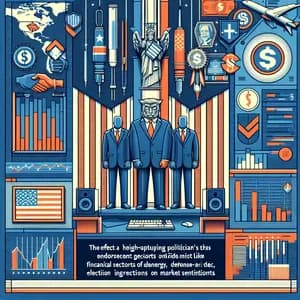Mastering Market Chaos: Smart Strategies for Investors During Trade Wars

Navigating the Market Chaos: Strategies for Stock Investors Amid Trade Wars
As stock investors, we are currently navigating through a turbulent landscape shaped by escalating U.S.-China trade tensions and their ripple effects on various sectors. The recent news indicates a significant impact on the financial markets, forcing investors to reassess their strategies. With volatility high and uncertainty rampant, it's crucial to examine how companies are faring amidst this chaos and what steps investors can take to safeguard their portfolios.
The Current Market Climate
Recent reports highlight that the U.S. dollar has slid to multiyear lows as trade tensions escalate, with implications for companies heavily involved in international trade. Additionally, Asian equity markets have been seesawing, reflecting the uncertainty investors are experiencing. Stocks are experiencing wild swings, with all three major U.S. indexes showing volatility.
Investors are faced with the dilemma of whether to 'buy the dip' or to hold off until the market stabilizes. It’s essential to ask critical questions about your investment strategy during such chaotic times.
Companies to Watch
- Apple Inc. ($AAPL): As one of the largest companies globally, Apple is significantly affected by trade policies due to its manufacturing base in China. Investors should watch for how tariff changes may impact costs and pricing strategies.
- NVIDIA Corporation ($NVDA): This tech giant relies heavily on international markets for its semiconductor products. With the ongoing trade tensions, NVIDIA faces pressure on its supply chains, which could affect its growth trajectory.
- Caterpillar Inc. ($CAT): Caterpillar, a leader in construction and mining equipment, is also feeling the pinch from rising tariffs. Its performance is closely tied to infrastructure spending, which could be hindered by trade uncertainties.
- Tesla, Inc. ($TSLA): Tesla’s global expansion strategy, particularly in China, makes it vulnerable to trade disputes. Investors should closely monitor how tariffs affect Tesla's pricing and sales strategies in one of its key markets.
- Alibaba Group Holding Limited ($BABA): As a major player in e-commerce and cloud computing, Alibaba stands at the forefront of U.S.-China trade relations. Analysts are keenly observing how the company navigates these challenges and the potential impact on its stock price.
Strategies for Investors
In light of these developments, investors should consider a diversified approach to mitigate risks associated with volatility. Here are some strategies to consider:
- Assess Your Portfolio: Evaluate which sectors are most vulnerable to trade disruptions and consider reallocating assets to more stable investments.
- Stay Informed: Keep up with news about trade negotiations and how they might affect your investments. Knowledge is power in uncertain times.
- Focus on Fundamentals: Look for companies with strong balance sheets and solid fundamentals. These companies are more likely to weather economic storms.
- Long-Term Perspective: While it may be tempting to react to short-term market fluctuations, a long-term investment strategy can often yield better returns.
Conclusion
The current financial markets are characterized by heightened volatility, driven by ongoing trade tensions between the U.S. and China. As investors, it is essential to stay informed and make strategic decisions based on both current events and long-term potential. By focusing on companies that are well-positioned to navigate these challenges, you can better manage your portfolio during this tumultuous time.
Read more: How to Tell What Your Home Will Be Worth in a Trade War, Dollar Slides to Multiyear Lows as U.S.-China Tariff War Escalates, Asian Stocks Seesaw as U.S.-China Trade Tensions Escalate.




